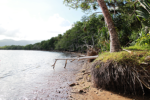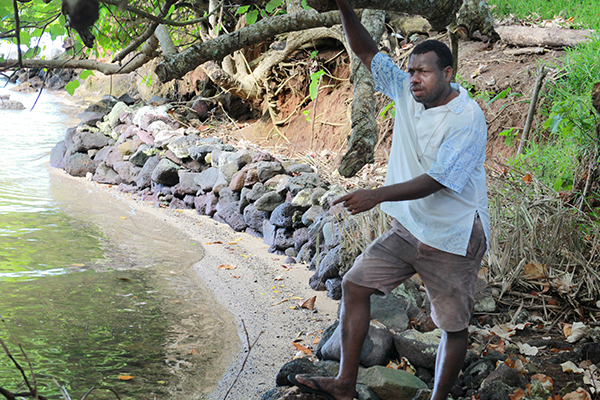ABM Archive Website
THIS WEBSITE CONTAINS ARCHIVE MATERIALS FOR HISTORICAL REFERENCE ONLY
For up-to-date information, including our latest appeals, news, and resources, please visit our current website.
ACT Alliance statement on climate change in the Pacific
November 14, 2018

ABM contributed to a statement on climate change in the Pacific that was recently endorsed by ACT Alliance, a worldwide coalition of 150 churches and faith-based organisations.
ACT Alliance’s General Assembly, held in Sweden on 28 October – 1 November 2018, endorsed the ACT Alliance public statement on climate change in the Pacific. The statement was formulated by members in the ACT Pacific sub-regional forum (PANZ) based on an early draft prepared by ABM. It drew on a key statement made by the Pacific Council of Churches – the 2016 Tokatoka Declaration on Climate Change, Disaster Risk Reduction and Resilience – as well as on 2018 research findings issued by the UN-backed Intergovernmental Panel on Climate Change.
The statement noted that ‘Small island nations in the Pacific are being disproportionately harmed by climate change, although their ecological footprint is negligible’. It called upon governments around the world to take bold action to rapidly reduce emissions to keep global warming to no more than 1.5°C above pre-industrial levels.
The full statement is as follows:
![]()
ACT Alliance public statement on climate change in the Pacific region
We affirm the Paris Agreement’s commitment to keep the global temperature rise below 1.5⁰C above pre-industrial levels and express the urgent need to adopt renewable energy sources and stop harmful greenhouse gas emissions, from all sources and sectors including through agriculture.
Many of the worst impacts of climate change are being felt in the Pacific region. Communities have experienced changing weather patterns and devastating weather events, including rising sea levels and droughts. In response, Pacific nations are taking the urgent need for climate action to the global stage while strengthening their disaster response and preparedness programmes at home. In Aotearoa New Zealand and Australia, member agencies of ACT Alliance have actively campaigned for climate action, most recently through support for the Zero Carbon Bill in Aotearoa.
Small island nations in the Pacific are being disproportionately harmed by climate change, although their ecological footprint is negligible. At the most recent Pacific Forum, leaders identified climate change as the single greatest threat to the livelihoods, security and wellbeing of Pacific peoples.
The 2017 World Risk Report names two Pacific countries as having the highest risk from natural disasters in the world: Vanuatu and Tonga. Three other Pacific countries (Fiji, Papua New Guinea and the Solomon Islands) are ranked in the top 15 for disaster risks. Fiji and Tonga have experienced severe cyclones in recent years. Rising sea levels regularly encroach on homes and lands, contaminating household water on vulnerable islands. Rising temperatures are also affecting the traditional food crops, thus threatening food security of communities in the region.
Several Pacific Island countries are already grappling with internal migration as a consequence of climate change and external migration is a frequent topic of discussion across the region. Given the strong interwoven connection between people and their own land and sea, this represents a great and permanent loss of humanity and its diversity. In the process a rich diversity of languages and cultures will be threatened as well as a corresponding loss in flora and fauna. Planning for external migration risks presents serious and complex global consequences with the emptying of nations.
Action in response to climate change is urgently needed and it must be global. Governments negotiating in the UNFCCC climate talks need to set and implement ambitious targets to reduce greenhouse gas emissions and contribute adequate climate finance for communities that are disproportionately affected. As part of the Pacific, ACT Alliance affirms the urgency of stronger national commitments under the Paris Agreement.
Faith-based organizations and local partners in the ACT PANZ network are already part of affected communities and are undertaking disaster preparedness training and preparations to deal with rising sea levels and increasingly volatile weather patterns. As an integral part of these communities, we will support each other to be the first responders and speak out about the impacts of climate change.
We affirm declarations made by Pacific faith communities including the 2016 Tokatoka Declaration on Climate Change, Disaster Risk Reduction and Resilience. This calls for “national, regional and global climate change and disaster risk reduction policy frameworks”, and demands that climate-induced migration and forced displacement of Pacific Island people is treated as “a human rights threat”. This follows the 2009 Moana Declaration which calls for ambitious limits to the release of greenhouse gases to safeguard the health and welfare of Pacific peoples.
We recognize the key role Pacific faith communities and our local partners play in strengthening local resilience. We acknowledge our responsibilities under Sustainable Development Goal 13 to ensure such measures receive the necessary finance. We commend the work of the Pacific Conference of Churches in promoting climate action and support its efforts to encourage churches to increase food security and resilience as part of its Green Church programme.
Because the primary responsibility lies with emitters of greenhouse gases, we urge governments around the world to take bold action to rapidly reduce emissions to keep global warming to no more than 1.5°C above pre-industrial levels. We especially call for action from Australia and New Zealand in our region. We call upon governments around the world to strengthen climate finance commitments, supporting initiatives that build climate resilience and adaptation and assist recovery from climate-induced disasters, and to specifically support the human rights of local communities whose way of life or livelihoods have been negatively affected by climate change.
 |
|
Fr Ben Gislapwos explains how a wall was built to stem the rising sea water at Port Patteson on Vanua Lava, |


